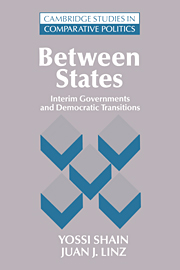Preface
Published online by Cambridge University Press: 05 August 2012
Summary
This book is the product of the authors' research and collaboration over many years. The project began, in a sense, in 1976 when Juan Linz presented a paper at the International Political Science Association in Edinburgh entitled “Time and Regime Change.” In this paper Linz addressed the question whether political scientists can develop models of regime change that would include a time dimension. His attention to timing as a political factor led him to examine the impact of speed and deadlines for the process of holding first free elections. Linz returned to this theme in his subsequent research on the Spanish transition, where the timing factor was central to the strategy and success of Adolfo Suarez. This early examination produced the hypothesis that a regime transition led by an incumbent is more conducive to a democratic outcome than one led by opposition-led provisional government. In this early paper Linz also noted how crucial the commitment of the Portuguese army-led provisional government to hold free elections one year after the 1974 coup was in insuring a democratic exit after a protracted transition. A revised version of this early paper was published in 1986 in Teoria Politica under the title “II fattore tempo nei mutamenti di regime.”
In 1986, Linz introduced his paper to Yossi Shain, then a doctoral student of Linz at Yale. Intrigued by Linz's comments on timing in politics Shain explored the time factor in his works on the politics of exiles, and subsequently decided to probe the subject of interim governments in a more systematic manner.
- Type
- Chapter
- Information
- Between StatesInterim Governments in Democratic Transitions, pp. xi - xivPublisher: Cambridge University PressPrint publication year: 1995

